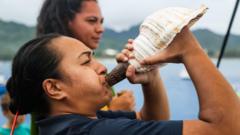In the crystal-clear waters surrounding the Cook Islands, a contentious decision looms that could reshape the fate of this Pacific nation. The soil at the bottom of the ocean, lined with polymetallic nodules rich in essential metals like cobalt, nickel, and manganese, is under scrutiny as debates rage about whether to mine these underwater treasures or preserve the fragile marine ecosystem. The country, grappling with the impacts of climate change, now sees deep-sea mining as a potential avenue for prosperity.
Jean Mason, curator of the Cook Islands Library and Museum, boldly likens the nodules to “chocolate truffles,” but warns, “just don’t eat them.” Such formations have taken millennia to develop and present a critical opportunity for the islanders, who currently rely heavily on tourism for over 70% of their income. Prime Minister Mark Brown advocates for the mining project, asserting that the income generated could secure a prosperous future for the nation’s 15 islands.
Despite the push from the government, critics are voicing serious concerns. Environmental activists warn that the consequences of extracting these nodules could have catastrophic repercussions on marine wildlife and the ocean's delicate ecosystems. They call for a moratorium on the mining initiative until thorough research can verify its environmental impact. Advocates for the mining initiative suggest it could help transition the world away from fossil fuels by supplying essential materials for renewable energy technologies.
This summer, a crowd protesting off Rarotonga’s coast illustrated the islanders' split sentiments regarding deep-sea mining. Activists like Alanah Matamaru Smith from the Te Ipukarea Society are demanding independent research on the potential risks. With newly minted exploration licenses granted to mining companies, the government’s rush to exploit the seabed does not sit well with all community members.
Rima Brown, a government employee, defends her nation’s right to tap into its seabed resources, framing the Cook Islands as "large ocean states." Many islanders argue against outside pressures dictating what they can and cannot do with their natural resources, emphasizing the need for financial independence in the face of climate challenges. Yet dissenters warn that mining could escalate the risks posed by climate change.
While discussions take place in government offices and at local consultations across the islands, residents remain divided. Some, fearing the diminishment of their oceanic wealth, echo activist sentiments encouraging caution. In contrast, proponents hold district meetings to build awareness about the opportunities mining presents.
As Prime Minister Brown pushes for progress on the mining initiative, maintaining the balance between economic prosperity and environmental sustainability will remain a complex challenge for the Cook Islands. The path they choose could either be one that leads to a thriving future or one that risks jeopardizing the very foundations of their existence.
In a world where climate change continues to threaten livelihoods, the Cook Islands find themselves at a crossroads, weighing economic benefits against the principles of environmental stewardship. What this island nation decides will resonate far beyond its tranquil shores.
Jean Mason, curator of the Cook Islands Library and Museum, boldly likens the nodules to “chocolate truffles,” but warns, “just don’t eat them.” Such formations have taken millennia to develop and present a critical opportunity for the islanders, who currently rely heavily on tourism for over 70% of their income. Prime Minister Mark Brown advocates for the mining project, asserting that the income generated could secure a prosperous future for the nation’s 15 islands.
Despite the push from the government, critics are voicing serious concerns. Environmental activists warn that the consequences of extracting these nodules could have catastrophic repercussions on marine wildlife and the ocean's delicate ecosystems. They call for a moratorium on the mining initiative until thorough research can verify its environmental impact. Advocates for the mining initiative suggest it could help transition the world away from fossil fuels by supplying essential materials for renewable energy technologies.
This summer, a crowd protesting off Rarotonga’s coast illustrated the islanders' split sentiments regarding deep-sea mining. Activists like Alanah Matamaru Smith from the Te Ipukarea Society are demanding independent research on the potential risks. With newly minted exploration licenses granted to mining companies, the government’s rush to exploit the seabed does not sit well with all community members.
Rima Brown, a government employee, defends her nation’s right to tap into its seabed resources, framing the Cook Islands as "large ocean states." Many islanders argue against outside pressures dictating what they can and cannot do with their natural resources, emphasizing the need for financial independence in the face of climate challenges. Yet dissenters warn that mining could escalate the risks posed by climate change.
While discussions take place in government offices and at local consultations across the islands, residents remain divided. Some, fearing the diminishment of their oceanic wealth, echo activist sentiments encouraging caution. In contrast, proponents hold district meetings to build awareness about the opportunities mining presents.
As Prime Minister Brown pushes for progress on the mining initiative, maintaining the balance between economic prosperity and environmental sustainability will remain a complex challenge for the Cook Islands. The path they choose could either be one that leads to a thriving future or one that risks jeopardizing the very foundations of their existence.
In a world where climate change continues to threaten livelihoods, the Cook Islands find themselves at a crossroads, weighing economic benefits against the principles of environmental stewardship. What this island nation decides will resonate far beyond its tranquil shores.



















